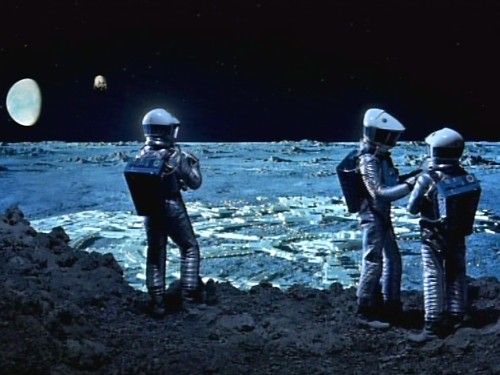Science Fiction is the New Realism
Inside, there were non-fiction essays by people like Ray Bradbury and Ursula Le Guin. But my favorite parts were the sci-fi stories by putatively "non-genre" writers like Jonathan Lethem, Jennifer Egan, and Junot Diaz. Diaz's story, "Monstro," was my favorite — set in a near-future, globally-heated, income-stratified Dominican Republic, where a creepy zombie infection across the border in Haiti is just getting started (apparently Diaz is working on extending the story into a novel).
But the thing that struck me most about the "sci-fi" stories was how grounded and plausible they seemed — in spite of their use of sci-fi tropes like cyborgs and zombie infections. Another story by Jennifer Egan tells of a beautiful woman spy with cybernetic implants that relay her senses to the CIA (in a demonstration of "the medium is the message," the story was published in 144-character segments on Twitter). Though it was set in the near future, and in spite of the Twitter gimmick, the story seemed completely plausible — we already have robot agents fighting overseas, while Google is building cyborg prototypes for networked, computer-enhanced vision.
And my favorite thing about "Monstro" were the details — not quite apocalyptic, but getting there — that made it feel like our everyday discomfort amidst income stratification and constant disaster. The story's horror builds in the background noise of a world in crisis with heat waves and third-world epidemics. Problems whose distance and relentlessness just don't merit that much attention (at first) from the protagonist narrator — not while he's chasing girls in the air-conditioned neighborhoods where the upper class lives.
All of which — the background static of freakish disasters on the 24-hour news cycle, combined with first-world indifference — feels a bit too familiar to call it "sci-fi," doesn't it?
I've also recently started reading the novels and essays of William Gibson, who's also has an essay in this same issue of the New Yorker. His books get shelved in the sci-fi section, even though most of them are pretty solidly rooted in contemporary Internet culture. It's not that Gibson is writing in a fantasy genre; the problem is that most contemporary literature feels like a genre that's stuck in the past, in a world without internet forums or cellphones. As critic Choire Sicha bitingly observes in Slate:
"The literary novel is, make no mistake, as much a pileup of inherited conventions as the worst werewolf cash-in. There are now thousands of young, MFA-toting writers, so many of them aping the weak generation of literary male novelists now in their 50s: pallid and insufferable teachers and idols, in light of the strong and inventive generation before them."Gibson's on Twitter as @greatdismal, which is where I first learned of him over a year ago. Appropriately enough, he's inspired at least one fake imitator account — a fictional cyberpunk version of the cyberpunk fiction author. I mention it here because that fake account recently summed up (admittedly with some out-of-character exaggeration) how science-fictional the reality of the last few days have been:
– from Choire Sicha's review of The Unreal and the Real, a new two-volume collection of stories by Ursula Le Guin
Unclassifiable mega-storm decimates swaths of Boston-Atlanta Metro. Axis. NJ residents vote by fax. World transfixed by S. Korean pop video.
— Authentic Wm. Gibson (@AuthenticWmGibs) November 5, 2012
The world we live in — with rich-world obesity epidemics, prefabricated cities rising in Asia, global heating, social media and its attendant transformation of our identities, financial crises, and everything else — has turned out to be far stranger than the old sci-fi stories of white Texan mavericks who landed rockets on Mars.
The weirdness of the future isn't a genre anymore: it's real life.
 Recommendations from authors mentioned in this post:
Recommendations from authors mentioned in this post: Distrust That Particular Flavor, essays by William Gibson (2012)
A Visit from the Goon Squad by Jennifer Egan (2010)
The Unreal and the Real: Selected Stories Volume One: Where on Earth by Ursula Le Guin (2012).












